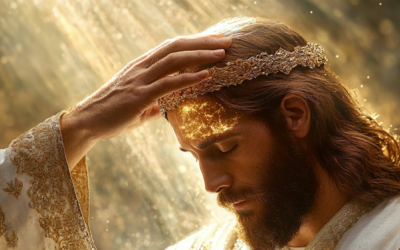“I and my Father are one.” (John 10:30)
This verse, among many others in the gospel of John, is misinterpreted to mean something that it does not. Oftentimes, this verse is used as a prime example in Trinitarian doctrine to refer to Jesus and the Father being part of one God. And since the Father is unquestionably God, then Jesus is also “unquestionably God.”
This is not at all what the verse is saying, nor is this the implied message that Jesus teaches.
This verse means that Jesus is one with the Father’s will. He and the Father are one in agreement in spirit and in truth. Everything that Jesus speaks, the Father agrees with. And there is a simple reason why the Father agrees with everything that Jesus speaks: because it is the Father who has told Jesus to speak it, which Jesus elaborated on in John 7:16 prior to addressing the Jews again in chapter 10:
“Jesus answered them, and said, My doctrine is not mine, but his that sent me.
[17] If any man will do his will, he shall know of the doctrine, whether it be of God, or whether I speak of myself.
[18] He that speaketh of himself seeketh his own glory: but he that seeketh his glory that sent him, the same is true, and no unrighteousness is in him.”
(John 7:16-18)
While John 7:16 may seem contradictory at first glance, John 7:16-18 illustrates that Jesus’ very testament—and by extension the entirety of the New Testament—is not HIS doctrine but God the Father’s doctrine. Jesus continues to claim that if we do the will of God, then we will know when Jesus is speaking about himself and when he is speaking about God. Jesus further attests that if anyone who speaks on behalf of his own will and intent are seeking the glory for themselves; but those who seek the glory of the Father, the same is true and no unrighteousness is in him. In every word and deed that Jesus said or did, he never sought his own glory—he served, by his own free will, to be the glory of the Father (John 1:14).
Armed with this knowledge, it is important to understand that Jesus’ mission is to reconcile everyone back to God because it is the Father who loves and cherishes us just as much as He does His only begotten Son. In verses prior, Jesus speaks of how he is the Good Shepherd, and those who hear his voice will follow him and none other (John 10:14-18).
Jesus was willing to lay down his own life for our sakes, and the Father knows this. Jesus’ love is overflowing and overabundant for his brothers and sisters, even though we commit sin. Can you possibly imagine a more perfect love than someone who is willing to give their life in exchange for yours? Jesus was willing to do so for even just one of his followers (Luke 14:5). Likewise, it is beyond our comprehension to think that someone would give up their own loved one, their own child, for another; God the Father loves us so much that He was willing to give His only begotten Son so that we may be made clean in His eyes and reach heaven (John 3:16). For me, this is only comprehensible if you are an all-powerful being. This is why the claim of saying Jesus is God is extremely dangerous, as it carries the implication that God “died” for our sins which further discredits God’s true nature and severely limits God’s power outside of the physical realm as a spiritual, all-knowing, all-powerful God.

Jesus will leave the flock just for one, for he knows the flock is safe with the Father.
It is important to understand that the doctrine that Jesus was preaching to the Jews—and collectively to the entire world—was not his doctrine, but the one who sent him. The only one who sent Jesus was God. And, according to scripture, there is only one God, the Father (1 Corinthians 8:6).
The context by which Jesus provides this statement is important to understand, particularly his following statements and the cross-references in the text that surround these following verses:
“My Father, which gave them me, is greater than all; and no man is able to pluck them out of my Father’s hand.
[30] I and my Father are one.
[31] Then the Jews took up stones again to stone him.
[32] Jesus answered them, Many good works have I shewed you from my Father; for which of those works do ye stone me?
[33] The Jews answered him, saying, For a good work we stone thee not; but for blasphemy; and because that thou, being a man, makest thyself God.
[34] Jesus answered them, Is it not written in your law, I said, Ye are gods?
[35] If he called them gods, unto whom the word of God came, and the scripture cannot be broken;
[36] Say ye of him, whom the Father hath sanctified, and sent into the world, Thou blasphemest; because I said, I am the Son of God?”
(John 10:29-36)
There is much to unpack here, starting with the bold statement that it was the Father [God] who gave Jesus all of his followers, for only God can attract people to the gospel that Jesus taught (John 6:44). Jesus then says that he and the Father are one, but what exactly does that mean…or rather what doesn’t it mean? When the Jews heard this, they accused Jesus of blasphemy, saying that he made himself out to be God. Jesus corrects them, stating quite the opposite: Jesus disclaims himself as God, but affirms himself as the Son OF God, as the chosen one that is sanctified by the one true God, the Father (John 17:3). There is a stark difference in Jesus claiming himself to be God and him claiming to be the Son of God. Remember, scripture cannot be broken, and for him to claim to be God would go against scripture and what he told the Jews previously. The Jews understood this, and many believed him after he clarified this truth (John 10:42).
This is not the only time that Jesus disclaims himself as God; Jesus has always addressed himself as the Son of God:
“And the high priest stood up in the midst, and asked Jesus, saying, Answerest thou nothing? what is it which these witness against thee?
[61] But he held his peace, and answered nothing. Again the high priest asked him, and said unto him, Art thou the Christ, the Son of the Blessed?
[62] And Jesus said, I am: and ye shall see the Son of man sitting on the right hand of power, and coming in the clouds of heaven.”
(Mark 14:60-62)
Jesus never once claimed to be the Blessed One [God]. Jesus knows that the Father is the Blessed One, and would never try to steal or take his Father’s glory. It is the Father who gives the spirit of wisdom to Jesus, raised Jesus from the dead, and sets him in His right hand in the heavenly places:
“That the God of our Lord Jesus Christ, the Father of glory, may give unto you the spirit of wisdom and revelation in the knowledge of him:
[18] The eyes of your understanding being enlightened; that ye may know what is the hope of his calling, and what the riches of the glory of his inheritance in the saints,
[19] And what is the exceeding greatness of his power to us-ward who believe, according to the working of his mighty power,
[20] Which he wrought in Christ, when he raised him from the dead, and set him at his own right hand in the heavenly places,”
(Ephesians 1:17-21)
When I first started reading the scriptures, I admittedly was a bit confused as to what Jesus truly meant when he said “I and my Father are one.” I always felt that as Christians, we were supposed to follow Jesus and become one with him; similarly to a husband and a wife being “one,” we are to be the “bride of Christ”—not “one being,” but one in agreement with each other. I always felt that Jesus wasn’t God, but almost every article I read said differently…
Until the Holy Spirit revealed John 17:21-24 to me.
I was reading the cross-references of John 10:29-36 and the Spirit led me to an epiphany; these critical verses explain the true meaning of what it means to be “one” with the Father like Jesus:
“That they all may be one; as thou, Father, art in me, and I in thee, that they also may be one in us: that the world may believe that thou hast sent me.
[22] And the glory which thou gavest me I have given them; that they may be one, even as we are one:
[23] I in them, and thou in me, that they may be made perfect in one; and that the world may know that thou hast sent me, and hast loved them, as thou hast loved me.
[24] Father, I will that they also, whom thou hast given me, be with me where I am; that they may behold my glory, which thou hast given me: for thou lovedst me before the foundation of the world.”
(John 17:21-24)
These verses solidified what I already knew in my heart: Jesus and the Father are one in agreement, but they are not one “being.” The glory given to Jesus by the Father, the alignment with the Father’s will, is meant for us also. It is impossible for us to be God; the oneness of Christ is to be in total agreement with the Father’s will. We are to deny ourselves and forsake our own will for that of Christ’s, which is also the Father’s will and be in perfect unity and harmony. Part of this realization comes from understanding that it was the Father, our God, who sent Jesus to be our Lord and Savior—not to be our God, but to be the one who leads us to God (John 14:6). Upon having this revelation and finding the scripture as confirmation, it was made abundantly clear that John 10:30 is not referring to Jesus and the Father being “one God” or one being, but that Jesus’ will and the Father’s will are one in spirit and truth. Not because they are both a nature or person of God’s character, but because the Son does whatever pleases the Father’s will. Every commandment, teaching, or deed was done for the glory of the Father.
Even still, I was left with this notion that if Jesus used his own free will to align with the Father…was there ever the possibility that Jesus thinks or wanted to say something differently from the Father? And the answer was quickly addressed by the Holy Spirit:
“I said therefore unto you, that ye shall die in your sins: for if ye believe not that I am he, ye shall die in your sins.
[25] Then said they unto him, Who art thou? And Jesus saith unto them, Even the same that I said unto you from the beginning.
[26] I have many things to say and to judge of you: but he that sent me is true; and I speak to the world those things which I have heard of him.
[27] They understood not that he spake to them of the Father.
[28] Then said Jesus unto them, When ye have lifted up the Son of man, then shall ye know that I am he, and that I do nothing of myself; but as my Father hath taught me, I speak these things.
[29] And he that sent me is with me: the Father hath not left me alone; for I do always those things that please him.
[30] As he spake these words, many believed on him.”
(John 8:24-30)
Jesus tells the Jews that he is the Son of man and that he can do nothing of myself, but only what the Father has taught him to speak. Jesus himself has many things to say and judge of the Jews, but he elects to speak only what the Father has taught him to speak because this is what is pleasing to the Father. Likewise, in Matthew 26:53-54, Jesus knows that he could ask the Father to give him twelve legions of angels to defend him, but in doing so he would compromise the fulfillment of the promises made in the scriptures. Jesus’ denial of his own self for God’s doctrine is unwavering, and he refuses to speak a single word that may displease his Father. Truly, this is what it means to be a servant to God’s word—a perfect model of being one with the Father’s will and coming into agreement with Him.
Jesus and the Father are one; and we are to become one, even as they are one.
Amen.



